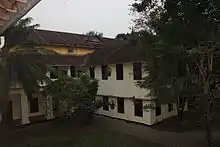Puthezhath Raman Menon | |
|---|---|
| Born | 19 October 1891 |
| Died | 22 September 1973 (aged 81) Kerala |
| Alma mater | |
| Occupation(s) | Essayist, historian, translator |
| Spouse | Janaki Amma |
| Parents |
|
| Awards |
|
Puthezhath Raman Menon (19 October 1891 – 22 September 1973) was an Indian writer of Malayalam literature. Known for essays, historical writings, biographies and translations, Menon was the first to translate Tagore's works into Malayalam. He was a judge at the Kerala High Court and was a recipient of the title, Sahitya Kushalan, conferred on him by the Rajah of Cochin. Kerala Sahitya Akademi honoured him with the distinguished fellowship in 1971.
Biography

Puthezhath Raman Menon was born in an ancient Nair family on 19 October 1891 at Manaloor, in Thrissur district of the South Indian state of Kerala to Kodaykkattu Parameshwara Menon and Pappi Amma.[1] After completing school education at Church Mission Society Higher Secondary School, Thrissur, he did his regular college education at Maharaja's College, Ernakulam and Madras Christian College before securing a degree in law to start a career as a lawyer at Thrissur. Later, he became a special prosecutor at the Magistrate Court in Thrissur and went on to hold such positions as those of a District Judge and Sarvadhikaryakkar to end his official career as a judge of the Kerala High Court.[1]
Menon, who served as the president of the Kerala Sahitya Akademi for five years from 1961 to 1966, was married to Moothedathu Janaki Amma, who was the foster daughter of one of his uncles. He died on 22 September 1973, at the age of 81.
Legacy and honours
Menon's entry into literature was by publishing humorous satires but later, he wrote general essays, biographies, historical books and translations.[2] He was the first to translate the works of Rabindranath Tagore into Malayalam.[1] His book, Sakthan Thampuran - Historical Novel,[3] published in 1942, is one of the small number of books which detail the life of Sakthan Thampuran, the erstwhile Rajah of Cochin.[4][5] His essays on Thrissur was later compiled as a book, Thrissur Trichur which has details about the cultural history of the place, its literary milieu and about Thrissur Pooram.[6][7] He was also associated with Kairali magazine, where he worked alongside G. Sankara Kurup and Joseph Mundassery,[8] though there were rumours of a rift between Kurup and Menon due to a remark made by Menon that no Malayalam writers deserved the Jnanapith Award, later won by Kurup in 1965.[9]
Menon, whose autobiography was titled Kazhchappadukal,[10] was conferred with the title of Sahitya Kushalan by the Rajah of Cochin. In 1971, he was inducted as a distinguished fellow by the Kerala Sahitya Akademi.[11]
Bibliography
- Raman Menon Puthezhath (1975). Chathuradhyayi. Retrieved 6 April 2019.
- Raman menon Puthezhathu (1952). Sahithyabhiruji. Kottayam: N.B.S.
- Raman menon puthezhath (1968). Sahasrakirananaya Tagore. Kottayam: N.B.S.
- Raman Menon, Puthezhathu (1971). Sugreevasakhyam. Kerala sahithya academi: Kerala Sahithya Academy.
- Raman Menon, Puthezhathu (1956). Hanumanum Vibheeshananum. Kamalalaya: Kamalalaya.
- Raman Menon, Puthezhathu (1956). Bhaliyum Sugreevanum. Kamalalaya: Kamalalaya.
- Raman Menon, Puthezhath (1964). Ramayanathil ninnu. Kamalalaya.
- Raman Menon, Puthezhathu (1954). Veekshana Vilasam. Thiruvananthapuram: Kamalalaya.
- Raman Menon, Puthezhathu (1964). Chinthamagnan. Current Books, Trichur: Current Books.
- Raman Menon, Puthezhathu (1962). Kalavilasam. Aamina Bk Stall: Aamina Book Stall.
- Raman Menon, Puthezhathu (1936). Damodaran nayarude diary. S.P.C.S.
- Raman Menon, Puthezhathu (1964). Sahithya sanukkalil. Mangalodayam: Mangalodayam.
- Raman Menon, Puthezhath (1954). Pusthaka pooja. Mangalodayam.
- Raman Menon Puthezhathu (1955). Arivulla anjanikal. Kottayam: N.B.S.
- Raman Menon, Puthezhathu (1972). Chithariya Chinthakal. S. K. V. Book Depot.
- Raman Menon Puthezhathu (1963). Yavaneswaranmar. P.K.Brothers.
- Raman menon puthezhath (1964). Upanyasa chandrika. P.K.Brothers: P.K.Brothers.
- Raman menon puthezhath (1964). Sahithya sadanam. P.K.Brothers: P.K.Brothers.
- Raman Menon, Puthezhathu (1992). Kaazhchappaadukal (aathmakatha). Thrissur, Sulabha Books.
{{cite book}}: CS1 maint: location missing publisher (link) - Raman Menon, Puthezhathu (1997). Thrissur-Trichur. Thrissur, Sulabha Books.
{{cite book}}: CS1 maint: location missing publisher (link) - Raman Menon, Puthezhath (1999). Raamaayana saparya. Thrissur, Sulabha Books.
{{cite book}}: CS1 maint: location missing publisher (link) - Raman Menon, Puthezhath (1997). Keralathe ariyuka. Thrissur, Sulabha Books.
{{cite book}}: CS1 maint: location missing publisher (link) - Raman Menon, Puthezhath. Harinakshi. Mangalodayam.
- Raman Menon, Puthezhath (1942). Sakthan Thampuran.
See also
References
- 1 2 3 "Biography on Kerala Sahitya Akademi portal". Kerala Sahitya Akademi. 5 April 2019. Retrieved 5 April 2019.
- ↑ "List of works". Kerala Sahitya Akademi. 5 April 2019. Retrieved 5 April 2019.
- ↑ A. Sreedhara Menon (4 March 2011). Kerala History and its Makers. DC Books. pp. 224–. ISBN 978-81-264-3782-5.
- ↑ "History of Cochin Royal Family". www.cochinroyalhistory.org. Retrieved 6 April 2019.
- ↑ "Sakthan Thampuran's 'anonymous' appearance triggers controversy - Times of India". The Times of India. Retrieved 5 April 2019.
- ↑ "Thattil Chettupuzhakaran Family". chettupuzhakaran.com. 5 April 2019. Retrieved 5 April 2019.
- ↑ "Puthezhath Raman Menon - Thrissur Trichur". download-books.com. Retrieved 5 April 2019.
- ↑ P. P. Raveendran (2002). Joseph Mundasseri. Sahitya Akademi. pp. 76–. ISBN 978-81-260-1535-1.
- ↑ വസന്തന്, എസ് കെ. "തമ്പുരാനോട് ജി പറഞ്ഞു: പറ്റില്ല". Mathrubhumi. Archived from the original on 6 April 2019. Retrieved 6 April 2019.
- ↑ Raman Menon, Puthezhathu (1992). Kaazhchappaadukal (aathmakatha). Thrissur, Sulabha Books.
{{cite book}}: CS1 maint: location missing publisher (link) - ↑ "Kerala Sahitya Akademi Fellowship". Kerala Sahitya Akademi. 6 April 2019. Archived from the original on 31 March 2019. Retrieved 6 April 2019.
External links
- "Portrait commissioned by Kerala Sahitya Akademi". Kerala Sahitya Akademi. 5 April 2019. Retrieved 5 April 2019.
- "Conferring fellowship". Kerala Sahitya Akademi. 6 April 2019. Retrieved 6 April 2019.